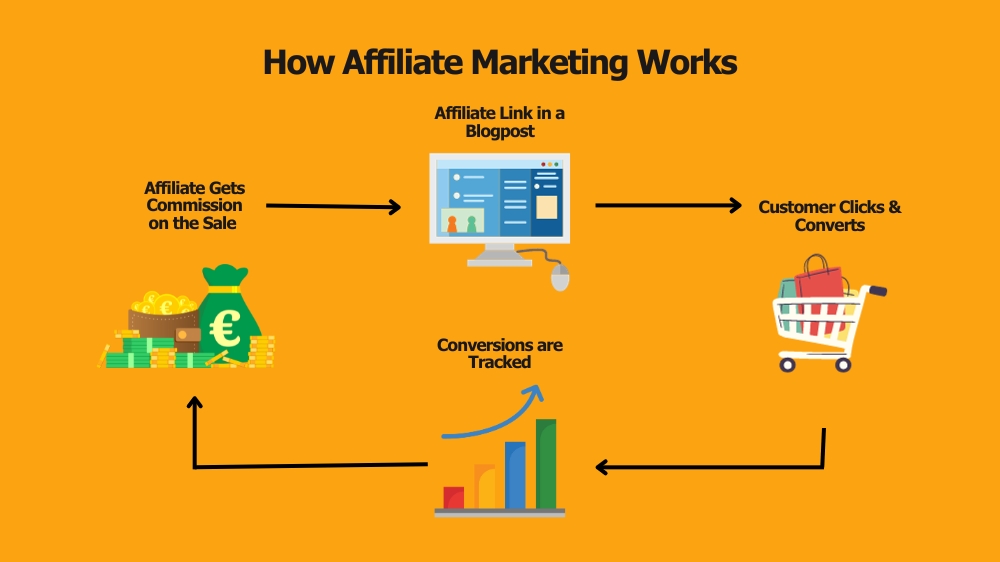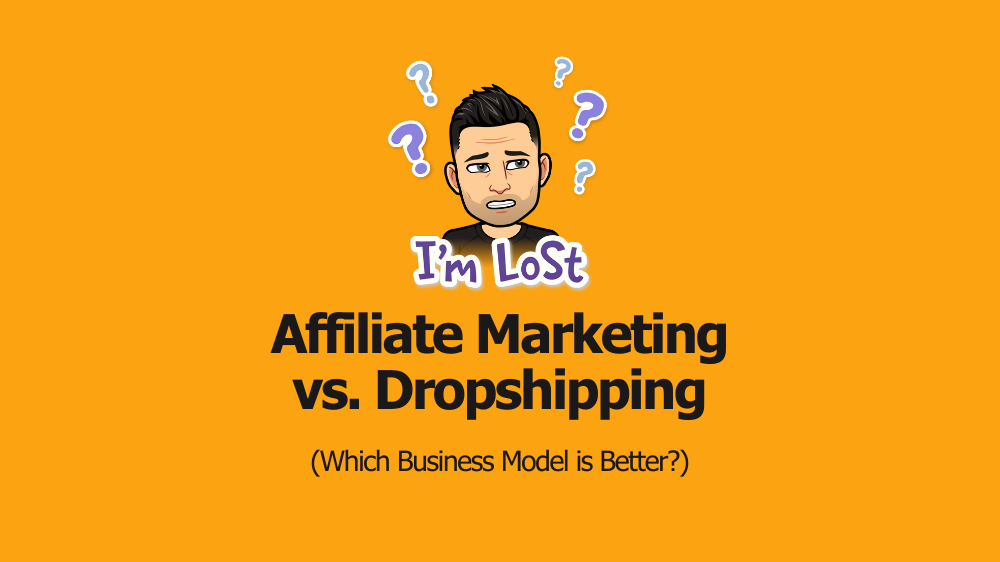In 2024, if you’re thinking about starting an online business, you’ve got two popular low-risk business models: affiliate marketing vs dropshipping. In this article, I’ll share my in-depth knowledge of both. We’ll look at what makes each model unique, their benefits and drawbacks, and how profitable they can be. Whether you’re new to the online business world or looking to change things up, understanding these options is key. Don’t worry, I’ll guide you and together, we’ll explore which model aligns best with your business goals and resources, helping you make an informed decision in today’s online-driven new economy.

Key Take-Away's
-
Choosing between affiliate marketing and dropshipping depends on personal skills, resources, and goals
-
Affiliate marketing is ideal for those with strengths in content creation and digital marketing, offering low startup costs and flexibility
-
Dropshipping suits those skilled in e-commerce and customer service, allowing for brand building and product control
-
Both models have evolving opportunities and challenges in line with 2024 market trends
-
Success in either model requires adapting to market demands, leveraging online traffic, and aligning with personal business visions
Post Outline:
1) Understanding Affiliate Marketing

This section will guide you through the essentials of building an affiliate marketing business. From its definition to the advantages and challenges it presents, I’ll share insights from my experience to help you understand how this model can fit into your online business strategy.
What is Affiliate Marketing?
In the Affiliate marketing model, you promote products or services for others and earn a commission from sales made through your unique affiliate link. For example, if you run an affiliate website or blog about fitness, you might partner with a sports equipment company. By placing their product links on your blog, each sale made through these links earns you a portion of the profit. This approach allows you to monetize your content or audience reach without creating your own products and dealing with all the stress that comes with it.
Pro's & Con's of Affiliate Marketing
I highly recommend reading my detailed article on this topic, for a more comprehensive understanding of the pros and cons of affiliate marketing. This will offer an in-depth look into the various aspects to consider if you’re thinking about pursuing affiliate marketing. However, here is a condensed list of pros and cons:
PRO’S:
- Low Start-Up Costs: Affiliate marketing is an affordable option as it doesn’t require a large investment to start. You just need a digital presence like a blog or social media account.
- Flexibility and Convenience: This model allows you to work from anywhere, offering the freedom to set your own schedule and work at your own pace.
- Passive Income Potential: With the right strategy, affiliate marketing can earn you money even when you’re not actively working, providing a stable income stream.
CON’S:
- Dependence on Third-Party Policies: Your income can be significantly impacted by changes in affiliate programs or company policies.
- High Competition: Since affiliate marketing is accessible and has a low barrier to entry, the market is highly competitive, making it challenging to stand out.
- Irregular Income: Earnings from affiliate marketing can fluctuate, making it less reliable as a sole income source.

2) Understanding Dropshipping

Dropshipping is a modern e-commerce model that’s reshaping the way entrepreneurs earn money online. It involves selling products through, for example, a Shopify ecommerce store, without holding any physical inventory. As a dropshipper, you act as a middleman between suppliers and customers, offering a unique blend of marketing and efficient logistics. Let me show you what dropshipping is, its advantages, and the challenges you might face and assess if the dropshipping model is the right business for you.
Pro's & Con's of Dropshipping
Starting a dropshipping business involves identifying a niche with potential demand, selecting reliable suppliers, and creating an e-commerce website, often with platforms like Shopify. Setting up your business legally is also important, including obtaining the necessary licenses. The final step is marketing your products, which can be done through various channels like social media (Meta, TikTok), search engine optimization (Google), and email marketing. This approach allows you to sell products without handling them directly, simplifying logistics and inventory management.
PRO’S:
- Low Overhead Costs: Dropshipping doesn’t require holding inventory, significantly reducing upfront investment and storage costs.
- Wide Product Selection: You can offer a variety of products without worrying about inventory or storage space.
- Scalability: As your business grows, scaling up is easier since you don’t handle the products directly.
CON’S:
- Low-Profit Margins: The ease of starting a dropshipping business means more competition, which often leads to lower profit margins.
- Supplier Reliability Issues: Supplier errors can affect your reputation over which you have little control.
- Less Control Over Shipping and Inventory: Relying on third-party suppliers means less control over product availability and shipping times, which can impact customer satisfaction.
3) Comparing Affiliate Marketing & Dropshipping
In this section, we’ll compare affiliate marketing and dropshipping. As seen in the previous section, each has pros and cons and caters to different styles of business management and marketing strategies. By comparing their key aspects, I’ll help you understand which might suit your goals and skills better. We’ll explore their differences, and similarities, and how each fits into the 2024 digital marketplace.

Key Differences and Similarities
|
Feature
|
Affiliate Marketing
|
Dropshipping
|
|---|---|---|
|
Control Over Pricing / Products
|
Limited control, as you promote existing product
|
More control over product selection and pricing
|
|
Investment and Cost
|
Lower initial investment, mostly in marketing
|
Higher costs due to website management and supplier fees
|
|
Profit Margins
|
Commission-based, dependent on the product and seller
|
In some instances higher as you set the prices
|
|
Logistics and Customer Service
|
Minimal responsibility as the seller handles it
|
More involvement needed in managing orders and customer service
|
Similarities:
- Both models do not require owning or manufacturing products
- Online marketing plays a crucial role in both strategies
- Flexible business models allow for remote operation
This comparison provides a snapshot of how these models differ and what they share. It is crucial to understand the differences when deciding which model aligns better with your personal preferences and business goals.
4) Which is More Profitable in 2024?
One of the key questions for online entrepreneurs is: Which model is more profitable, affiliate marketing or dropshipping? Let’s look at the current market trends, profitability factors, and potential returns on investment for each model. With the online marketplace continually evolving, understanding these aspects is crucial for choosing a path that not only aligns with your skills but also promises financial rewards.

Understanding and Evaluating Profitability
Let’s take a closer look at how each model, affiliate marketing and dropshipping, can be profitable:
Affiliate Marketing
In affiliate marketing, profits come from earning commissions on product sales. The key to success lies in your ability to drive substantial traffic to your affiliate link and convert that traffic into sales. Profitability depends on factors like the niche you choose, the commission rates offered by various affiliate networks and programs, and your marketing skills. Successful affiliate marketers leverage content marketing, SEO, and social media to attract and engage audiences. Your earning potential can be significant, especially if you tap into high-commission products or services. Affiliate marketing generally requires less initial investment, often just the marketing costs and the expenses of setting up your own website or a social media presence.
Dropshipping
Dropshipping’s profitability, on the other hand, revolves around selling products at a markup from their wholesale price. Success in the dropshipping business model depends on finding profitable niches, effectively marketing products, managing supplier relationships, and providing excellent customer service. While the model allows for higher control over margins, it also involves challenges like handling returns and shipping issues. Your profit margins can be squeezed by intense competition unless you can differentiate your store with unique products or superior marketing strategies. Dropshipping might require more upfront capital for website setup, purchasing domain names, and potential advertising costs.
Both models have the potential for profitability, but their success greatly depends on your marketing skills, niche selection, and commitment to the business.

Market Trends and Predictions
Affiliate Marketing: Watch out for these trends in affiliate marketing for the coming year. There’s a growing trend towards niche-specific products, emphasizing the importance of targeted content and personalized marketing strategies. Influencer collaborations are also becoming more prevalent, leveraging their engaged audiences for higher conversion rates.
Consider the rise of health and wellness products. As people become more health-conscious, an affiliate marketer focusing on this niche is finding more success by partnering with brands that offer organic or fitness-related products.
Dropshipping: Here, we are seeing a shift towards eco-friendly and sustainable products, as consumer awareness about environmental issues rises. Dropshippers who specialize in sustainable home products, like biodegradable cleaning supplies or energy-saving gadgets, are tapping into a market that’s both conscious and growing.
Additionally, advancements in e-commerce technology, like AI and AR, enhance the online shopping experience, offering new opportunities for dropshippers to create unique customer experiences.

5) Which Model Should You Choose?
Choosing between affiliate marketing and dropshipping isn’t just about market trends and profitability, it’s also a personal decision. There are factors you should consider based on your skills, resources, and goals. Every entrepreneur is different, and understanding these personal aspects will help guide you toward the model that best fits your unique situation. Whether you thrive in content creation or excel in customer relations, let’s look at how you can align your strengths and preferences with the right business model.
Assessing Your Skills and Resources
Are you skilled in content creation, and SEO, and have a strong online presence? Then affiliate marketing might be more suitable. For instance, bloggers or social media influencers often succeed in this model. Conversely, if you have a knack for e-commerce, manage customer support, and are comfortable dealing with suppliers, then dropshipping could be a better fit. For example, individuals with experience in online retail or those who enjoy the challenge of managing an online store might excel in dropshipping. Your choice should align with your strengths and available resources.

Long-term Goals and Business Vision
If you envision building a brand and developing a loyal customer base, dropshipping offers more scope for this, as you’re selling products under your own brand. For example, if you want to create a recognized eco-friendly product line, dropshipping aligns with that vision. In contrast, affiliate marketing is more suitable if your goal is to generate passive income through content creation. This is ideal for those who aim to monetize a blog or social media channel over time without the complexities of managing a product line.
Final Thoughts
The question of dropshipping vs affiliate marketing in 2024 depends on your personal skills, resources, and long-term goals. Affiliate marketing excels with low start-up costs and flexibility, suited for those skilled in content creation and marketing. Dropshipping offers brand-building potential and control over product selection, ideal for those with a passion for e-commerce. Both have their pros and cons, and their profitability aligns differently with market trends. Your decision should reflect your strengths, goals, and vision for the future. Remember, starting your own online business is unique to you, and either path holds potential for success.

FAQ
Is Dropshipping Better than Affiliate Marketing?
Whether dropshipping is better than affiliate marketing depends on your skills, goals, and resources. Dropshipping allows more control over products and branding but requires more involvement in logistics. An affiliate business is great for those with strong marketing skills and looking for lower start-up costs.
Can I do Both Dropshipping and Affiliate Marketing?
Yes, you can do both dropshipping and affiliate marketing. Many entrepreneurs combine these models to maximize revenue streams. While each requires different strategies and focus, combining them can diversify your business and income sources.
How do I Earn in Affiliate Marketing?
In affiliate marketing, you earn by promoting products or services and receiving a commission for each sale made through your referral links. This requires building a platform, like a blog or social media page, to attract and engage an audience, and then directing them to the products.
How Profitable is Dropshipping?
Dropshipping can be a profitable business model, especially if you find the right niche and effectively market your products. Your profit comes from the difference between the wholesale and retail prices. However, it’s competitive and requires careful management of customer service and supplier relationships.





